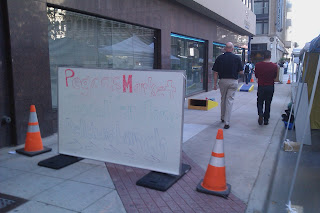One of the major tenets of the New Urbanism movement is that public places need to be made for people. Taking a look at major public spaces around the world, the most common activity among them is sitting.
Washington Square Park in New York City creates a respite from hectic urban life by providing many places where you can relax. Successful urban spaces allow people to change gears by offering a distraction to business, work, and domestic chores.
My good friend Stacy Cherones of
Get Healthy Dallas says "Leisure is not a luxury." In other words, people deserve distractions from the daily grind to regardless of race, creed, or income. At
Google, for example, innovative work is balanced with recreation, which in turn makes employees more productive. If people enjoy their work environment, employers will see a more industrious workforce.
Every Friday this October, DEOM has teamed up with
Downtown Dallas Inc. to create the
Pegasus Plaza Outdoor Market. The mission of this project is to provide Downtown workers, residents, and tourists the distraction that urban spaces are able to provide.
 |
| More people on construction laden sidewalk than Market |
Weeks before the Market, polling Downtown workers showed that they didn't know the name of the plaza and that pedestrians shuffled by with blinders on, unaware of their surroundings. In fact, the first Pegasus Market showed that people were reluctant to interact with the marketplace and took pains to avoid it.
At the first two Pegasus Markets, it was baffling that people chose to walk on the difficult terrain of the sidewalks than to walk through the closed street where we set up vendors. Perhaps these people were too used to their lunch routine, or maybe they didn't want to shop for anything. I also considered that the passersby thought that the event wasn't open to them. Despite our efforts to obstruct normal pathways, people still trudged on through.
 |
| People continue to walk on sidewalk despite obstruction. |
After the second Pegasus Market, we received news from Downtown Dallas Inc. that we were over budget and could no longer afford to close Akard as part of the Special Event Permit. The urbanism activist in me was disappointed because I believe in shutting down streets and limiting automobile access in favor of pedestrian walkways, but in this case, it was a blessing in disguise. Dallasites aren't ready to walk on the streets. They respect the car and its territory too much to question its authority in urban mobility. Still, word of mouth in combination with familiarity and with human comfort attracted more people to the third Pegasus Plaza Outdoor Market than the previous two.
 |
| The sidewalk is more comfortable than the street. |
Jane Jacobs wrote in her book
The Economy of Cities that diversity in cities promotes innovation and development of new work and production. The benefit of the Market in the middle of Downtown Dallas is that locally made, distinct, and unfamiliar products are given fresh exposure to a new group of people. As these entrepreneurs make sales, new products are added to the market and their manufacture can be sustained. In order for the vendors to make sales, the customers need a comfortable and inviting marketplace to come to. Long story short, people need enjoyable public spaces to contribute to local economy.
People in Dallas need re-education in the use of public space. Public places should be designed for human leisure, like eating, relaxing, and other distractions. A real city provides leisurely amenities for its people in order to benefit their well being and their economy.



